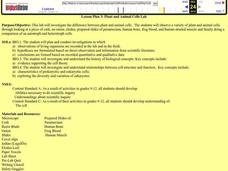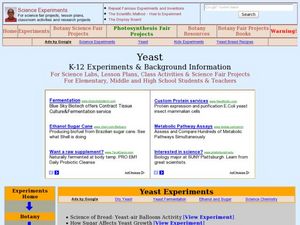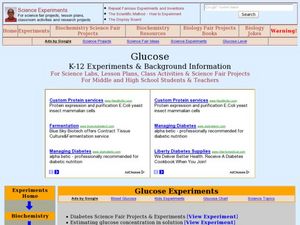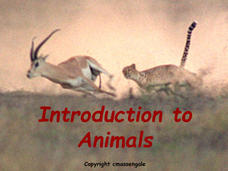Curated OER
Genetic Variation Worksheet
Fill- in-the-blank, labeling, and short answer questions make up this well-written cell division worksheet. Neat diagrams of chromosomes and dividing cells are included. Junior biologists show what they know about reproduction, meiosis,...
Curated OER
AP: Chapter 26: Origin of Life
Five pages take biologists on a generalized survey of the origin of life. Queries are made regarding theories of how life developed, ancient Earth conditions, and the ever-changing field of taxonomy. The experiments of different...
Curated OER
Biology: Understanding Cellular Organelles
Students distinguish the differences between Prokaryotic and Eukaryotic cells. Using microscopes, they examine a variety of plant and animal cells. Working in groups, they draw and label plant and animal cells and show the mathematical...
Serendip
How Do Biological Organisms Use Energy?
When an organism eats, how does food become energy? Young biologists follow glucose through the process of cellular respiration to the creation of ADP using a discussion-based activity. The resource also highlights conservation of mass...
Curated OER
Classification/Taxonomy/Statistics Review
"Does King Phillip Cry Over Flimsy Grass Stems?" You might not answer that question with this exhaustive worksheet, but your biology class will get the full scoop on the hierarchy of biological classification with this resource. It...
Curated OER
Organelles
Students explore the functions of major eukaryotic organelles. They compare and contrast prokaryotic and eukaryotic cells. Given diagrams and drawings, students take turns drawing structures, discussing their function, and labeling...
Curated OER
A View of the Cell
For this cell worksheet, students will match 13 vocabulary words relating to cells to the correct definition. The cell vocabulary words cover all the parts of the cell plus eukaryotes, and prokaryotes.
Curated OER
Cell Me What?
Young scholars compare and contrast the characteristics of robots and cells. For this biology lesson, students examine the parts and function of cell organelles. They create a visual representation of their cell/robot analogy.
Curated OER
Plant and Animal Cells
Students investigate the difference between plant and animal cells. They observe a variety o plant and animals cells by looking at a piece of cork, an onion, elodea, prepared slides of paramecium, human bone, frog blood, and human...
Curated OER
A Cell Is Like A City
Students create analogies that help them remember the cell parts as well as their respective functions.
Curated OER
Cell Reviews
Pupils draw cells, make a cell, and list organelles in plant and animal cells. In this cells lesson plan, students create edible cells.
Virginia Department of Education
Classification of Organisms
Searching for the perfect indoor/outdoor activity that allows class members the opportunity to learn about organism classification? Here, pupils research organisms and categorize them according to domain and kingdom over the course of...
Howard Hughes Medical Institute
Spreadsheet Tutorial 2: Autofill Data, Cell References, and Standard Deviation
If you've always wanted to know more about spreadsheets, here's a perfect resource for you. A self-paced tutorial introduces how to autofill and copy formulas in a Google sheet or Excel spreadsheet. It also shows users how to find range,...
Curated OER
Regulating Gene Expression
In this genes worksheet, students review the system that controls gene expression and the enzymes required for regulating genetic expression. This worksheet has 6 fill in the blank and 7 short answer questions.
Curated OER
Cell Division: The Cell Cycle and Mitosis
Learners will be able to identify the different stages of the eukaryotic cell cycle as well as the different stages of mitosis in the proper order. Students will also be able to recognize what organelles of the cell are integral to...
Virginia Department of Education
Prokaryotes
Lead your biology class on a cell-sized adventure! Emerging scientists construct models of prokaryotes, then design an experiment to properly grow a bacterial culture. They conclude the activity by viewing the culture under a microscope....
Curated OER
The Five Kingdoms
An overview of the five kingdoms within the biological classification system is presented in this set of five slides. The first lists the objectives of the slide show, and the second gives general characteristics of plant, animal, and...
Curated OER
A View of the Cell
In this viewing of a cell worksheet, learners will read a paragraph about how microscopes work and will use a diagram of a light microscope to complete 2 short answer questions.
Curated OER
Yeast
Young scholars study the characteristics of yeasts. In this biology lesson, students conduct experiments to measure yeast respiration. They discuss the favorable conditions needed for growing them.
Curated OER
Mutation and Genetic Change
In this genetic change worksheet, students read about how mutations can occur in germ cells and somatic cells. Students complete 1 multiple choice and 4 short answer questions.
Curated OER
Glucose
High schoolers conduct various experiments on glucose. For this biology lesson, students differentiate the process of diffusion and osmosis. They test different foods for the presence of glucose and starch.
Biology Junction
Introduction to Animals
Out of all animals, elephants alone lack the ability to jump. Scholars learn all about animals using a presentation full of fun examples. It describes different types of animals, the biological similarities and differences between...
Curated OER
Gene Regulation Mechanisms
Students explore genetics. They discuss how chromosomes and/or genes are regulated during the life of an organism. In a lab setting, students compare and contrast the genomic regulation of prokaryotic and eukaryotic cells using...

























